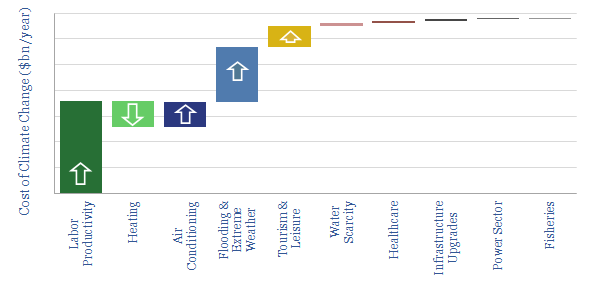The unmitigated costs of climate change would likely reach $1.5trn per year after 2050, exerting an enormous toll on the world. However, the costs of the energy transition will exceed $3trn per year. This might seem to undermine the economic justification for combatting climate change. Does this paradox matter? And what does it mean?
Our lowest cost roadmap to reach ‘net zero’ CO2 by 2050 is outlined on pages 2-3, re-capping the work we published at the end of 2020 (note here). We estimated that the best route to net zero will be costing an incremental $3trn per annum by the 2040s.
Polarized perspectives on our roadmap are discussed on pages 4-6. Some decision-makers argue that costs are irrelevant when it comes to saving the planet. Others fear energy transition initiatives are overly expensive and will achieve very little.
Hence we have estimated the costs of unmitigated climate change in the latter half of the 21st century, using a framework derived from the International Panel on Climate Change (IPCC). Our estimate for $1.5trn per annum of cost is explained on pages 7-10.
It gets worse. Climate change is not fully prevented by reaching ‘net zero’ by 2050. There are also risks of creating geopolitical imbalances. These issues are explored on pages 11-12.
What does it mean? Thunder Said Energy is a research consultancy focused upon economic opportunities that can drive the energy transition. There is still good justification for this objective. Hence we conclude the note with six possible resolutions to our paradox, discussed on pages 13-14.
Resolving the paradox? We would welcome your own opinions on our paradox in a new survey, linked here. We will share anonymized responses with all those who contribute.
